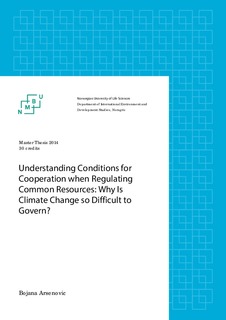| dc.description.abstract | International community has had little success in solving the problem of governing shared natural resources, of which the changing climate is the most prominent example. I wanted to know why. To answer this question I explored the conditions for achieving collective goals and providing for public goods, using the theory of collective action as a tool for analysis. First I examined collective action conditions in local settings, by looking into research conducted on local level natural resource management. Based on insights from the local settings I further investigated conditions for collective action in the international system. That I did by presenting the fundamental differences between the Montreal Protocol and the Kyoto Protocol, setting out an overview of existing international cooperation on climate change. Due to the anarchical nature of the international system with no central authority to enforce laws, agreements between states cannot be legally binding, which gives the states strong incentive to free-ride. In a system with economy based on competition where states are primarily interested in growth, the prospects for successful joint efforts to curb dangerous climate change seem rather gloomy. | nb_NO |

